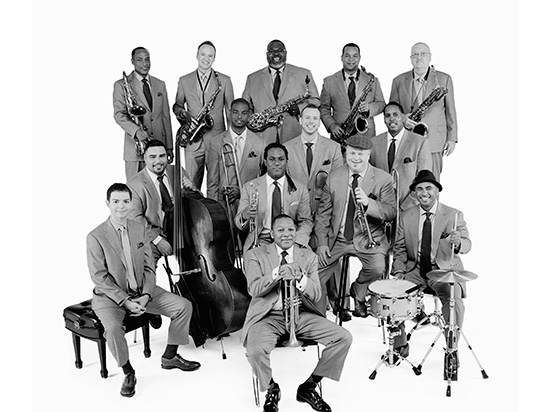REVIEW: Jazz at Lincoln Center Orchestra: Celebrating the Jazz Drum @ Boston Symphony Hall 04/09

On Sunday April 9, The Jazz at Lincoln Center Orchestra (JALC) brought their virtuosity and sophistication to Boston Symphony Hall as part of the Boston Celebrity Series. As America’s premier jazz ensemble, under the direction of trumpet icon Wynton Marsalis, the Jazz at Lincoln Center Orchestra brings together some of today’s finest jazz players to bring classic and contemporary jazz pieces full of stellar improvisation to audiences around the world.
Although Wynton Marsalis typically conducts the ensemble, he deferred to drummer Ali Jackson to propel the fourteen-piece orchestra through two sets centered around the jazz drum. The first set was curated by Jackson to celebrate jazz legend Buddy Rich’s recent centennial. Rich’s prolific career as a drummer began as a child star, and included stints as a big band leader, bebop sideman, and martial arts instructor in the military. Jackson’s loving tribute paid homage to each of these eras with arrangements performed by Rich himself, and included big band standards like “Love for Sale” and Duke Ellington’s “Cottontail.” Using mutes and impressive dynamic control, the ensemble skillfully recreated the sound of the big band era, when Rich and his band were hugely popular.
In addition to classic big band arrangements, the set also included smaller arrangements as tribute to Rich’s later work as a sideman. Among them was a soulful rendition of “Somebody Loves Me” featuring baritone saxophonist Paul Nedzela on melody, a bluesy piano solo by Dan Nimmer, and Jackson on brushes, as well as a quintet performance of Charlie Parker’s “Bloomdido,” with the rhythm section behind alto saxophonist Ted Nash and special guest trumpeter Mikey Rodriguez.
After intermission, Jackson led the orchestra in an extended original piece entitled “Living Grooves: A World in Jazz Rhythm.” As its name suggests, the sweeping six-part suite incorporated rhythms and instruments from across time and the globe. The piece opened with dark, heavily syncopated movement built around the African shekere before transitioning smoothly to a swinging solo section. As the hi-hat faded to silence, the entire ensemble became percussionists, using shakers, hand drums and tambourines from Africa and Brazil to create a rhythmic mosaic around cowbell and triangle melodies. This eventually gave way to samba as the instrumentalists reentered, some with flutes instead of saxophones. The next two movements drew from blazing-fast swing (held down expertly by Jackson), and Middle Eastern influences respectively, while the penultimate movement featured Chris Chrenshaw on tuba for a New Orleans-infused march featuring impressive call-and-response solos from Marsalis and tenor saxophonist Victor Goines. Finally, the suite came to close with a melodious choral from the saxophone section that slowly incorporated counter melody from the trombones and trumpets and ended with a furious soprano saxophone solo from Sherman Irby.
Jackson’s drumming was stellar throughout the concert. Buddy Rich was known for some of the fastest, most virtuosic drum solos in jazz history. Rather than directly trying to emulate Rich, Jackson soloed with his own, distinct style that highlighted his virtuosity and captivated the audience. In particular, his military-style snare work in “Bugle Call Rag” evolved into a massive drum roll that lasted over two minutes and drew cheers from the crowd. As a whole, the orchestra gave an amazing performance, blending tight unison playing with ambitious improvised solos that sounded spectacular with the acoustics of Symphony Hall. Best of all, they managed to capture the joyous spirit of jazz music. Despite the formal setting of the hall, Marsalis and others could be heard cheering on and congratulating their fellow soloists in true jazz fashion. They were constantly listening to and playing off of each other to create a vibrant, virtuosic performance that was a fitting tribute to Buddy Rich and the instrument that he played so well.
-Chris Bunting